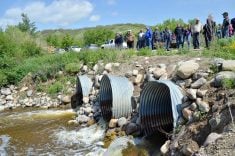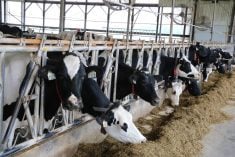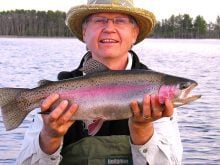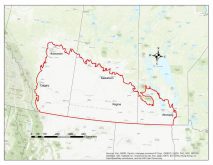Despite its thousand lakes, Manitoba needs to plan to use its water more efficiently as it develops a new water management strategy, says the International Institute of Sustainable Development (IISD).
“We’ve always thought of ourselves as a water-rich jurisdiction,” said Dimple Roy, IISD’s director of water management.
In May, the province announced up to $1 million to develop and implement a new provincial water management strategy.
On July 13, the province began asking for public input on the strategy via a survey and comments on engagemb.ca. That remains open until August 13.
Read Also

KAP flags risky trade for Manitoba farmers
Tariffs, market access uncertainty, trade diversification and export infrastructure top the agenda at Keystone Agricultural Producers (KAP) annual meeting.
IISD has participated in the expert consultation process for the strategy.
Manitoba’s old water strategy harkens back to 2003 and was one of the oldest, if not the oldest, in Canada, said Roy.
There’s mention of water-use efficiency in Manitoba’s past water management strategy and policy, she said. Meanwhile, some municipalities are limited in their growth by access to water, she added.
The new strategy proposes to make this a priority says provincial explainer Engaging Manitobans on Water Management.”
We can learn a lot from drought-prone areas that have been forced into more efficient use, said Roy.
“We can be doing so much more with just reusing our water.” This may include capturing rainwater and run-off as much as possible, including on agricultural land, and using ‘grey water’ (relatively clean wastewater) municipally.
“As opposed to turning the tap on saying ‘we have unlimited supplies of water,’” Roy said.
The new strategy will likely focus far more on climate change and adaptation. The previous strategy had very little — or nothing — to say on the topic, said Roy.
“Clearly, since 2003 we’ve seen an increasing urgency and acceleration of climate impacts.”
One of the guiding principles for the new strategy will be to take a long-term planning approach that takes climate change into account, the province said. Short-term milestones will also be needed.
Manitoba is vulnerable to change in general and needs to actively embed climate adaptation into its water management and municipal planning processes, said Roy, noting that since 2003, water management data has vastly improved. “We’re living in a time of unprecedented data.”
The province needs to use this data better and share it better so it’s making decisions where most needed and reinforce what’s working, said Roy.
IISD has also urged the province to make Indigenous peoples and their knowledge much more of a focus in the new strategy.
The province has indicated that will happen, saying it the explainer, “The unique Indigenous relationship with water and land, and the use of traditional knowledge, are important aspects to understand, consider and respect.”
Other priorities the province outlined included protecting the quality and quantity of groundwater and surface water; supporting economic development and addressing water-based limits to growth; linking land and water planning; and ensuring a basis in science and evidence.
















